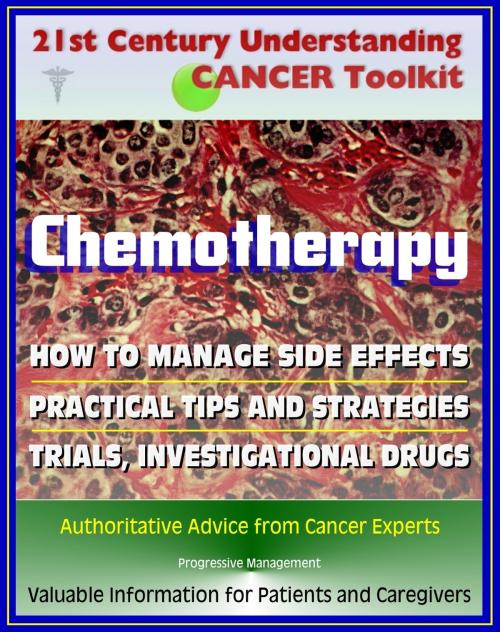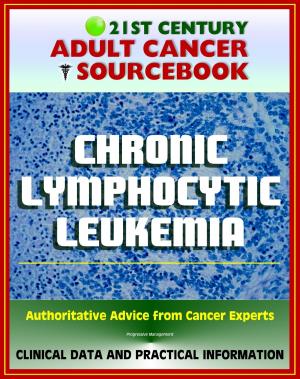21st Century Understanding Cancer Toolkit: Chemotherapy, Management of Side Effects, Trials, Investigational Drugs - Information for Patients, Families, Caregivers about Chemo
Nonfiction, Health & Well Being, Health, Ailments & Diseases, Cancer| Author: | Progressive Management | ISBN: | 9781458176172 |
| Publisher: | Progressive Management | Publication: | February 4, 2011 |
| Imprint: | Smashwords Edition | Language: | English |
| Author: | Progressive Management |
| ISBN: | 9781458176172 |
| Publisher: | Progressive Management |
| Publication: | February 4, 2011 |
| Imprint: | Smashwords Edition |
| Language: | English |
Authoritative information, tips, and practical advice from the nation's cancer experts about chemotherapy, providing coverage of all aspects of this vital form of cancer therapy, with particular emphasis on the practical management of side effects. Starting with the basics, and advancing to detailed patient-oriented information, this comprehensive compilation gives empowered patients, families, and caregivers the information they need to understand chemotherapy in all its forms. Conveniently organized contents include: Chemotherapy and You * Managing Chemotherapy Side Effects - Sexual and Fertility Changes in Men * Anemia * Appetite Changes * Bleeding Problems * Constipation * Memory Changes * Mouth and Throat Changes * Nerve Changes * Pain * Sexual and Fertility Changes in Women * Skin and Nail Changes * Swelling (Fluid retention) * More Choices in Cancer Care: Information for Beneficiaries on Medicare Coverage of Cancer Clinical Trials * Tamoxifen: Questions and Answers * Adjuvant and Neoadjuvant Therapy for Breast Cancer * Access to Investigational Drugs * Targeted Cancer Therapies * Cancer Vaccines * Follow-up Care After Cancer Treatment * An extensive supplement provides background data on cancer; information on how to find resources in your own community; questions and answers about cancer; cancer information sources; cancer in the environment - what you need to know and what you can do; and facing forward - life after cancer treatment. * The first of twenty documents on chemotherapy states: Chemotherapy and You is written for you — someone who is about to receive or is now receiving chemotherapy for cancer. This book covers: Questions and answers about chemotherapy. Answers common questions, such as what chemotherapy is and how it affects cancer cells. Side effects and ways to manage them. Explains side effects and other problems that may result from chemotherapy. This section also has ways that you and your doctor or nurse can manage these side effects. Tips for meeting with your doctor or nurse. Includes questions for you to think about and discuss with your doctor, nurse, and others involved in your cancer care. Ways to learn more. Lists ways to get more information about chemotherapy and other topics. Words to know. * Chemotherapy (also called chemo) is a type of cancer treatment that uses drugs to destroy cancer cells. Chemotherapy works by stopping or slowing the growth of cancer cells, which grow and divide quickly. But it can also harm healthy cells that divide quickly, such as those that line your mouth and intestines or cause your hair to grow. Damage to healthy cells may cause side effects. Often, side effects get better or go away after chemotherapy is over. Depending on your type of cancer and how advanced it is, chemotherapy can: Cure cancer — when chemotherapy destroys cancer cells to the point that your doctor can no longer detect them in your body and they will not grow back. Control cancer — when chemotherapy keeps cancer from spreading, slows its growth, or destroys cancer cells that have spread to other parts of your body. Ease cancer symptoms (also called palliative care)— when chemotherapy shrinks tumors that are causing pain or pressure. * This is a privately authored news service and educational publication of Progressive Management. For over a quarter of a century, our news, educational, technical, scientific, and medical publications have made unique and valuable references accessible to all people. Our e-books put knowledge at your fingertips, and an expert in your pocket!
Authoritative information, tips, and practical advice from the nation's cancer experts about chemotherapy, providing coverage of all aspects of this vital form of cancer therapy, with particular emphasis on the practical management of side effects. Starting with the basics, and advancing to detailed patient-oriented information, this comprehensive compilation gives empowered patients, families, and caregivers the information they need to understand chemotherapy in all its forms. Conveniently organized contents include: Chemotherapy and You * Managing Chemotherapy Side Effects - Sexual and Fertility Changes in Men * Anemia * Appetite Changes * Bleeding Problems * Constipation * Memory Changes * Mouth and Throat Changes * Nerve Changes * Pain * Sexual and Fertility Changes in Women * Skin and Nail Changes * Swelling (Fluid retention) * More Choices in Cancer Care: Information for Beneficiaries on Medicare Coverage of Cancer Clinical Trials * Tamoxifen: Questions and Answers * Adjuvant and Neoadjuvant Therapy for Breast Cancer * Access to Investigational Drugs * Targeted Cancer Therapies * Cancer Vaccines * Follow-up Care After Cancer Treatment * An extensive supplement provides background data on cancer; information on how to find resources in your own community; questions and answers about cancer; cancer information sources; cancer in the environment - what you need to know and what you can do; and facing forward - life after cancer treatment. * The first of twenty documents on chemotherapy states: Chemotherapy and You is written for you — someone who is about to receive or is now receiving chemotherapy for cancer. This book covers: Questions and answers about chemotherapy. Answers common questions, such as what chemotherapy is and how it affects cancer cells. Side effects and ways to manage them. Explains side effects and other problems that may result from chemotherapy. This section also has ways that you and your doctor or nurse can manage these side effects. Tips for meeting with your doctor or nurse. Includes questions for you to think about and discuss with your doctor, nurse, and others involved in your cancer care. Ways to learn more. Lists ways to get more information about chemotherapy and other topics. Words to know. * Chemotherapy (also called chemo) is a type of cancer treatment that uses drugs to destroy cancer cells. Chemotherapy works by stopping or slowing the growth of cancer cells, which grow and divide quickly. But it can also harm healthy cells that divide quickly, such as those that line your mouth and intestines or cause your hair to grow. Damage to healthy cells may cause side effects. Often, side effects get better or go away after chemotherapy is over. Depending on your type of cancer and how advanced it is, chemotherapy can: Cure cancer — when chemotherapy destroys cancer cells to the point that your doctor can no longer detect them in your body and they will not grow back. Control cancer — when chemotherapy keeps cancer from spreading, slows its growth, or destroys cancer cells that have spread to other parts of your body. Ease cancer symptoms (also called palliative care)— when chemotherapy shrinks tumors that are causing pain or pressure. * This is a privately authored news service and educational publication of Progressive Management. For over a quarter of a century, our news, educational, technical, scientific, and medical publications have made unique and valuable references accessible to all people. Our e-books put knowledge at your fingertips, and an expert in your pocket!















